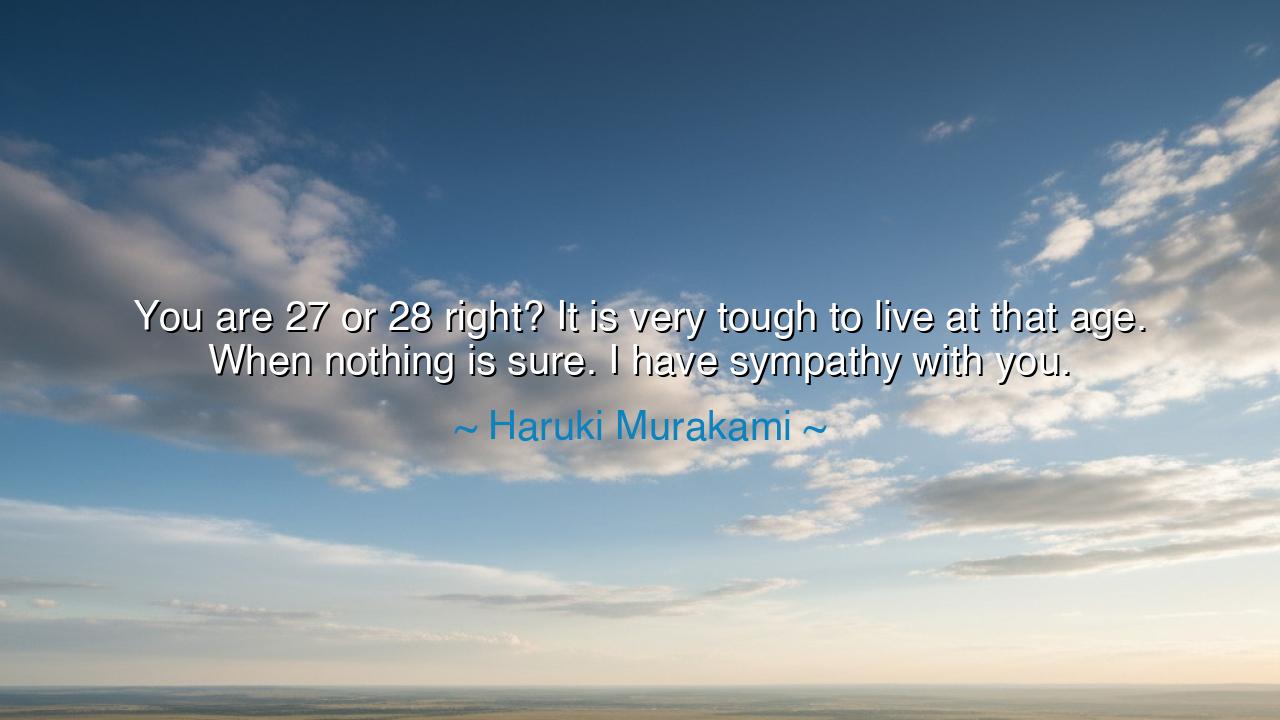
You are 27 or 28 right? It is very tough to live at that age.
You are 27 or 28 right? It is very tough to live at that age. When nothing is sure. I have sympathy with you.






“You are 27 or 28 right? It is very tough to live at that age. When nothing is sure. I have sympathy with you.” — Haruki Murakami
Thus spoke Haruki Murakami, the poet of solitude, the quiet observer of modern souls adrift between dream and daylight. In these simple, tender words, he reveals one of life’s most secret truths: that the years between youth and maturity, when the heart burns bright but the path remains unseen, are among the hardest of all. At twenty-seven or twenty-eight, one stands at a crossroads — no longer a child, not yet settled in the certainties of age. It is a season of questioning, of restlessness, of inward storms. Murakami’s sympathy is not condescension but compassion; he speaks as one who has walked that uncertain road himself, and remembers its weight.
In the modern age, the late twenties are an invisible trial. Society no longer dictates the rites of passage it once did — no fixed moment to mark adulthood, no clear promise of destiny. One is told to chase dreams, but also to be practical; to find love, yet guard independence; to plan for the future, while living for the present. Such contradictions tear quietly at the heart. At twenty-seven, nothing is sure — not work, not love, not even one’s sense of self. It is an age of mirrors, where we gaze at our reflection and see not who we are, but who we might become — and fear that the answer may never come.
Murakami himself lived these words. Before he was an acclaimed novelist, he was a young man managing a small jazz bar in Tokyo, drifting through life with more questions than plans. It was in this uncertain time, around the age of thirty, that he heard the crack of a baseball bat at a stadium — an ordinary sound that struck him like revelation. In that instant, he knew he must write. He closed his bar, sat at his kitchen table, and began his first novel, Hear the Wind Sing. Thus, from the fog of uncertainty emerged the clear voice of purpose. His sympathy for those at twenty-seven and twenty-eight is born not of theory, but of memory — he too once walked that shadowed valley where one’s future trembles like a mirage.
The ancients, too, understood this twilight between youth and age. Alexander the Great had conquered the known world by his early thirties, yet his victories brought him no peace; he died restless, still searching for meaning. Buddha, in his late twenties, left behind his palace, his family, and his wealth to wander in search of enlightenment. And Jesus of Nazareth began his ministry at thirty, after years of silence and preparation. There is something sacred in this threshold — this time when the soul must burn away its illusions to discover its truth. To live through it is painful; to survive it, transformative.
Murakami’s sympathy is thus the tenderness of an elder speaking to those still struggling with the birth pangs of identity. He reminds us that uncertainty is not failure, but initiation. The confusion, the anxiety, the feeling of standing still while the world races ahead — these are not signs of weakness, but of growth. The roots of a tree do not stretch toward the sky; they sink into darkness first. So it is with the soul at twenty-seven — it must dig deep before it can rise. To those who despair in this season, Murakami whispers: be patient with yourself. The fog will lift.
For though nothing is sure at twenty-seven, everything is still possible. The years of doubt are not wasted years; they are the soil in which conviction is born. The heart that questions itself learns humility, and the mind that fears uncertainty learns courage. To live without knowing is the beginning of wisdom. As Murakami’s own stories teach, life is a long, strange journey through invisible worlds — and only those who endure the confusion of the beginning can reach the serenity of the middle.
Practical counsel for the seeker:
-
Do not fear uncertainty; it is the crucible in which your purpose will be forged.
-
Seek stillness amid confusion — clarity does not come through panic, but through patience.
-
Surround yourself with art, books, and kind souls; they will remind you that you are not alone.
-
And when life feels shapeless, remember: even the novelist began with a blank page.
For as Haruki Murakami teaches, there is no shame in not knowing. The late twenties are not a failure, but a threshold — the sacred chaos before creation. To live through this time is to learn endurance, to listen for the faint voice of your true calling amid the noise of the world. And when, at last, the fog clears, you will see that the uncertainty that once frightened you was not a curse, but the quiet preparation of your soul for all it was meant to become.






AAdministratorAdministrator
Welcome, honored guests. Please leave a comment, we will respond soon